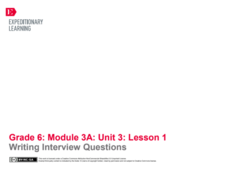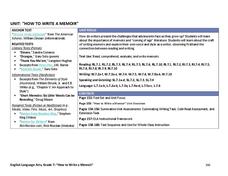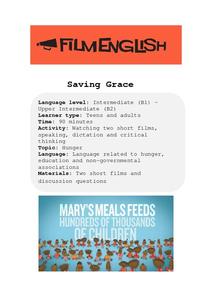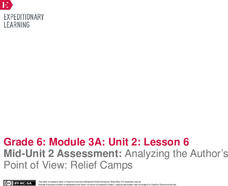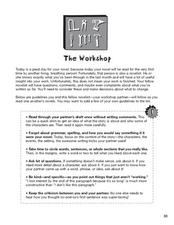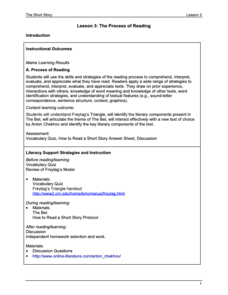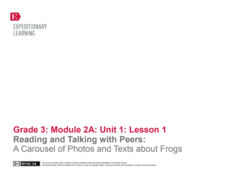Reed Novel Studies
The Wind In The Willows: Novel Study
True friends stick together. In the case of The Wind In The Willows, the friends just happen to be a toad, mole, rat, and badger who team up to beat the weasels. The resource covers the first chapter of their raucous adventures. Scholars...
Curated OER
"The Gambler" and "The Journey": A Comparison of Worlds in Two Short Stories
“The Gambler” and “The Journey” offer readers an opportunity to experience two very different views of Jewish life in Poland between WWI and WWII. Whether used as a part of a study of the Holocaust, or as a compare/contrast exercise, the...
EngageNY
Writing Interview Questions
And now for the star witness! Scholars take a look at a model newspaper article and discuss the importance of eyewitness accounts. In groups of three, they take turns underlining text from eyewitnesses. They then regroup to talk about...
Louisiana Department of Education
How to Write a Memoir
Who are we and what shapes our identities? Seventh graders work to answer this question as they learn how to write a memoir. Full of non-print resources and supplemental texts that range from fiction to non-fiction, scholars write their...
PBS
Curious George: Fan and Blow
What kind of wind works best to make things move? After watching a short video from Curious George, super scientists answer the question by testing various wind-making tools. Learners observe, record, and share their findings.
Film English
Saving Grace
Bring up the topic of world hunger in your class with two emotional videos. The short films are about a program for educating and feeding children around the world. Class members talk about poverty and pay close attention to the numbers...
EngageNY
End of Unit Assessment: Text to Film Comparison
Scholars work on an end-of-unit assessment to put all of their learning together. They complete short answer questions about gist, multiple choice questions about A Midsummer Night's Dream, and complete graphic organizers comparing film...
Lesson Locker
Z for Zachariah: Questions for Study on Chapters 1 - 10
An efficient study guide for the first 10 chapters of Z for Zachariah that covers basic recall questions concerning the characters and the plot. It also includes short writing prompts for selected chapters that extend into the themes,...
EngageNY
Mid-Unit 2 Assessment: Analyzing the Author’s Point of View: Relief Camps
We're halfway there ... what a relief! Scholars read an excerpt from a primary source about the relief camps associated with the1906 San Francisco earthquake. Next, they complete a mid-unit assessment, answering short-answer and...
EngageNY
Mid Unit 2 Assessment: Text to Film and Perspective Comparison of to Kill a Mockingbird (Chapter 18 and One Scene from Chapter 19)
Have you ever heard someone say the movie is not like the book? Scholars complete a mid-unit assessment to compare scenes from the novel To Kill a Mockingbird to the movie version. The assessment contains short answers, multiple choice,...
Consortium for Ocean Science Exploration and Engagement (COSEE)
Carbon Dioxide & Krill: Impacts
What effects do temperature and carbon dioxide levels have on the zooplankton of Antarctica? This concluding lesson plan in a short unit on climate change and the ocean helps environmental scientists answer these questions. After...
Curated OER
Using Environmental Models to Determine the Effect of Acid Rain on an Ecosystem
Demonstrate to your middle school science learners how chalk breaks down in a weak acid. Discuss what affects acidic rain might have on ecosystems. Lab groups then choose one of two questions: "How does acid precipitation affect an...
Curated OER
The Workshop
Kids take a critical look at each other's work in order to understand the editing process while providing constructive suggestions. This handout really sets learners up to successfully offer constructive critique to their peers. Helpful...
Maine Content Literacy Project
The Process of Reading vocabulary, literary elements
Cover Freytag's Triangle and examine Anton Chekhov's "The Bet" in this third lesson plan in a series of fourteen based around short stories. Learners take a quiz and discuss Freytag's triangle. They apply the triangle to "The Bet" and...
Annenberg Foundation
Gothic Undercurrents
Terror, mystery, excitement. American writers of the 19th century, including Nathaniel Hawthorne, Herman Melville, and Emily Dickinson, used these elements to create morally ambiguous tales that challenged the prevailing belief in...
Maine Content Literacy Project
Introduction to John Updike
Expand your pupils' understanding of the short story genre with a study of John Updike and his story "A&P." This lesson plan, the fourth in a series of fourteen, invites learners to examine literary terms and read and discuss the...
EngageNY
Reading and Talking with Peers: A Carousel of Photos and Texts about Frogs
Frogs are the theme of a lesson plan that challenges scholars to examine photographs, read informational texts, then ask and answer questions. Scholars work collaboratelively as they rotate through stations, discuss their observations,...
Film English
Inseparable
Built around a moving short film about second chances and tough choices, this lesson mixes grammar, prediction, and narrative writing. Pupils practice with adjectives and prefixes before moving on to the film. The resource directs you to...
Student Achievement Partners
Jacob and Wilhelm Grimm - "The Fisherman and his Wife"
Help young readers learn to read and interpret complex text independently. Teach young children to ask interpretive questions and use the text itself to answer them. Use art, word play and drama to provide a deeper understanding of...
iCivics
Washington’s Water
It's easy to forget about something as simple as water, a substance that is easily available to many in the world. However, understanding water management and the importance of a renewable resource system becomes clear in an informative,...
Teach Engineering
How Antibiotics Work
Take two pills and call me in the morning. The first lesson in a short unit of four introduces class members to delivery methods of medicines. The instruction introduces the question of which delivery method is best to get you feeling...
EngageNY
Modeling a Context from a Verbal Description (part 2)
I got a different answer, are they both correct? While working through modeling problems interpreting graphs, the question of precision is brought into the discussion. Problems are presented in which a precise answer is needed and others...
Newseum
Quick Skim or Deep Dive? Picking the Right Search Strategy
To search online to find answers to some questions requires only a quick skim, while others demand deep research. Scholars engage in a lesson that teaches them the difference and how to craft questions that produce the best online search...
University of Pennsylvania
Decoding Propaganda: J’Accuse…! vs. J’Accuse…!
Reading snail mail is a great way to go back into history and to understand others' points of view. The resource, the second in a five-part unit, covers the Dreyfus Affair. Scholars, working in two different groups, read one letter and...




